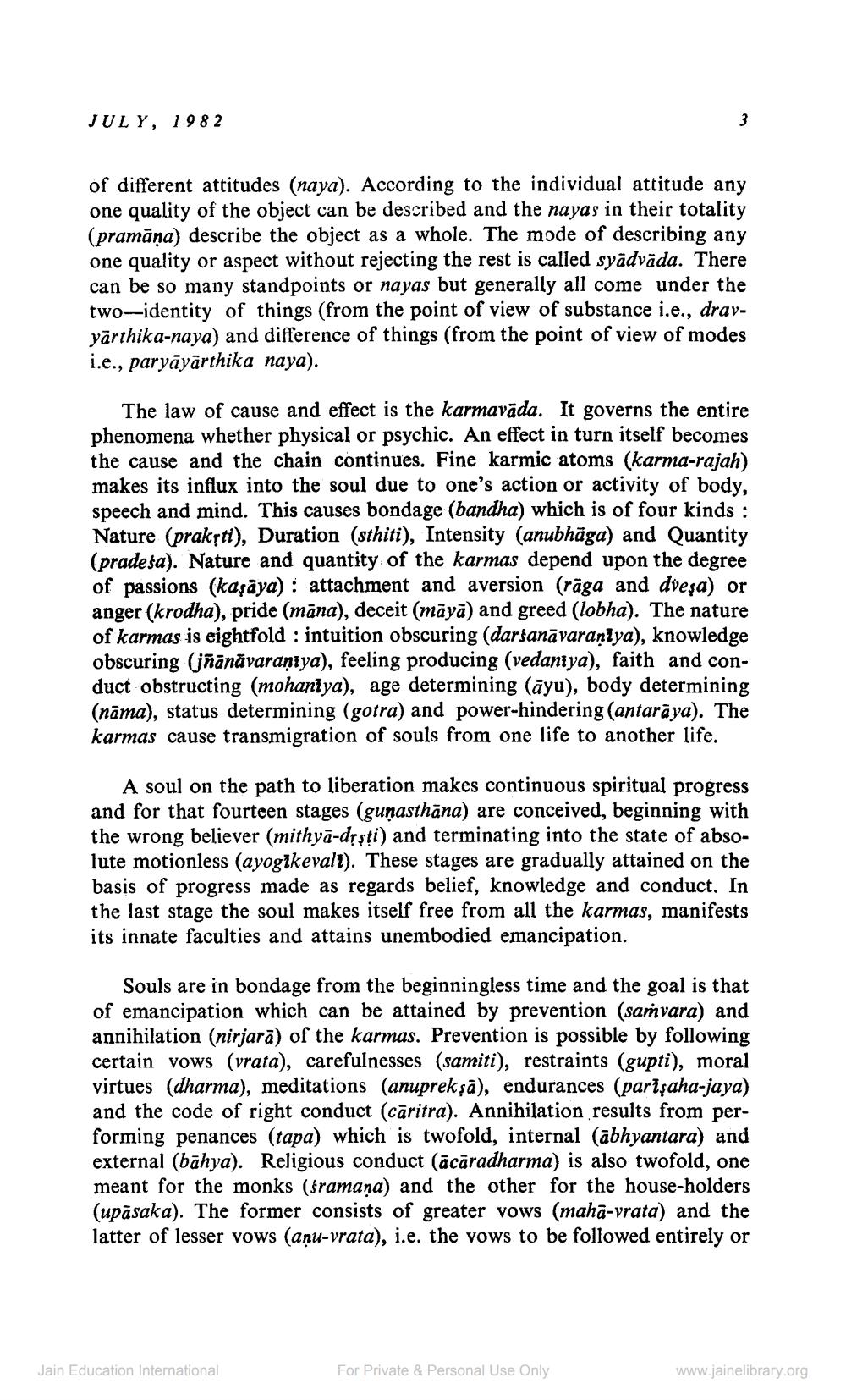Book Title: Jain Journal 1982 07 Author(s): Jain Bhawan Publication Publisher: Jain Bhawan Publication View full book textPage 8
________________ JULY, 1982 3 of different attitudes (naya). According to the individual attitude any one quality of the object can be described and the nayas in their totality (pramāna) describe the object as a whole. The mode of describing any one quality or aspect without rejecting the rest is called syâdvāda. There can be so many standpoints or nayas but generally all come under the two-identity of things (from the point of view of substance i.e., dravyarthika-naya) and difference of things (from the point of view of modes i.e., paryāyārthika naya). The law of cause and effect is the karmavāda. It governs the entire phenomena whether physical or psychic. An effect in turn itself becomes the cause and the chain continues. Fine karmic atoms (karma-rajah) makes its influx into the soul due to one's action or activity of body, speech and mind. This causes bondage (bandha) which is of four kinds : Nature (prakrti), Duration (sthiti), Intensity (anubhāga) and Quantity (pradeta). Nature and quantity of the karmas depend upon the degree of passions (kaşaya) : attachment and aversion (rāga and dveşa) or anger (krodha), pride (māna), deceit (māyā) and greed (lobha). The nature of karmas is eightfold : intuition obscuring (darsanāvaraniya), knowledge obscuring (jñānāvaraniya), feeling producing (vedaniya), faith and conduct obstructing (mohaniya), age determining (āyu), body determining (nama), status determining (gotra) and power-hindering (antaraya). The karmas cause transmigration of souls from one life to another life. A soul on the path to liberation makes continuous spiritual progress and for that fourteen stages (gunasthāna) are conceived, beginning with the wrong believer (mithyā-drști) and terminating into the state of absolute motionless (ayogikevalt). These stages are gradually attained on the basis of progress made as regards belief, knowledge and conduct. In the last stage the soul makes itself free from all the karmas, manifests its innate faculties and attains unembodied emancipation. Souls are in bondage from the beginningless time and the goal is that of emancipation which can be attained by prevention (samvara) and annihilation (nirjara) of the karmas. Prevention is possible by following certain vows (vrata), carefulnesses (samiti), restraints (gupti), moral virtues (dharma), meditations (anuprekşā), endurances (parışaha-jaya) and the code of right conduct (caritra). Annihilation results from performing penances (tapa) which is twofold, internal (ābhyantara) and external (bahya). Religious conduct (ācāradharma) is also twofold, one meant for the monks (framana) and the other for the house-holders (upāsaka). The former consists of greater vows (maha-vrata) and the latter of lesser vows (anu-vrata), i.e. the vows to be followed entirely or Jain Education International For Private & Personal Use Only www.jainelibrary.orgPage Navigation
1 ... 6 7 8 9 10 11 12 13 14 15 16 17 18 19 20 21 22 23 24 25 26 27 28 29 30 31 32 33 34 35 36 37 38 39 40 41 42 43
